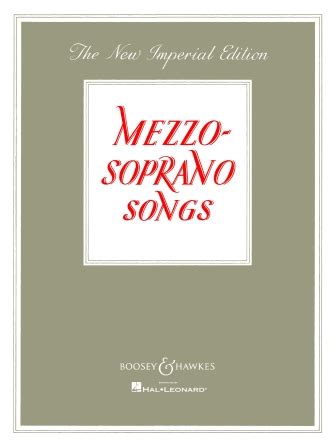The mezzo-soprano voice is a versatile and expressive one, capable of singing both high and low notes with ease. Mezzo-sopranos are often featured in opera, musical theatre, and classical music. If you’re a mezzo-soprano looking for new songs to add to your repertoire, here are a few of the most popular and well-loved arias:

Opera Arias for Mezzo-Soprano
**Carmen, Habanera** (from Carmen by Georges Bizet)
**Dalila, Mon coeur s’ouvre à ta voix** (from Samson et Dalila by Camille Saint-Saëns)
**Eboli, O don fatale** (from Don Carlo by Giuseppe Verdi)
**Amneris, Aida** (from Aida by Giuseppe Verdi)
**Orfeo, Che farò senza Euridice** (from Orfeo ed Euridice by Christoph Willibald Gluck)
**Charlotte, Werther! Qui m’aurait dit** (from Werther by Jules Massenet)
**Rosina, Una voce poco fa** (from The Barber of Seville by Gioachino Rossini)
**Cenerentola, Nacqui all’affanno** (from La Cenerentola by Gioachino Rossini)
**Cherubino, Voi che sapete** (from The Marriage of Figaro by Wolfgang Amadeus Mozart)
**Octavian, Mein Herr Marquis** (from Der Rosenkavalier by Richard Strauss)
Musical Theatre Songs for Mezzo-Soprano
**Adelaide, Maybe This Time** (from Cabaret by John Kander and Fred Ebb)
**Fantine, I Dreamed a Dream** (from Les Misérables by Claude-Michel Schönberg and Herbert Kretzmer)
**Elphaba, Defying Gravity** (from Wicked by Stephen Schwartz)
**Morticia, Secrets of the Family Vault** (from The Addams Family by Andrew Lippa)
**Mrs. Lovett, By the Sea** (from Sweeney Todd by Stephen Sondheim)
**Velma, Cell Block Tango** (from Chicago by John Kander and Fred Ebb)
**Sandy, You’re the One That I Want** (from Grease by Jim Jacobs and Warren Casey)
**Rizzo, There Are Worse Things I Could Do** (from Grease by Jim Jacobs and Warren Casey)
**Mrs. Potts, Beauty and the Beast** (from Beauty and the Beast by Howard Ashman and Alan Menken)
**Ursula, Poor Unfortunate Souls** (from The Little Mermaid by Howard Ashman and Alan Menken)
Classical Music Songs for Mezzo-Soprano
**Brahms, Alto Rhapsody, Op. 53**
**Mahler, Rückert-Lieder**
**Schubert, Der Hirt auf dem Felsen, D 965**
**Strauss, Lieder**
**Wolf, Mörike-Lieder**
Tips for Choosing Songs for a Mezzo-Soprano
When choosing songs for a mezzo-soprano, it’s important to consider the singer’s vocal range, tessitura, and vocal color. The mezzo-soprano voice is typically characterized by its warm, rich tone, and mezzo-sopranos are often best suited to songs that lie in the middle of the vocal range. However, mezzo-sopranos with a wide vocal range may be able to sing songs that lie both above and below the middle range.
It’s also important to consider the singer’s tessitura, which is the part of the vocal range that is most comfortable for the singer to sing in. Mezzo-sopranos with a high tessitura may be more comfortable singing songs that lie in the upper part of the vocal range, while mezzo-sopranos with a low tessitura may be more comfortable singing songs that lie in the lower part of the vocal range.
Finally, it’s important to consider the singer’s vocal color. Mezzo-sopranos with a bright, clear vocal color may be better suited to songs that require a lot of projection, while mezzo-sopranos with a dark, rich vocal color may be better suited to songs that require a more intimate sound.
Conclusion
The mezzo-soprano voice is a versatile and expressive one, capable of singing a wide variety of songs. When choosing songs for a mezzo-soprano, it’s important to consider the singer’s vocal range, tessitura, and vocal color. With careful consideration, you can choose songs that will showcase the mezzo-soprano’s unique vocal qualities and allow her to shine.
Additional Resources
- The Metropolitan Opera: Mezzo-Soprano Roles
- The Kennedy Center: Mezzo-Soprano
- Royal Opera House: Mezzo-Soprano Arias
